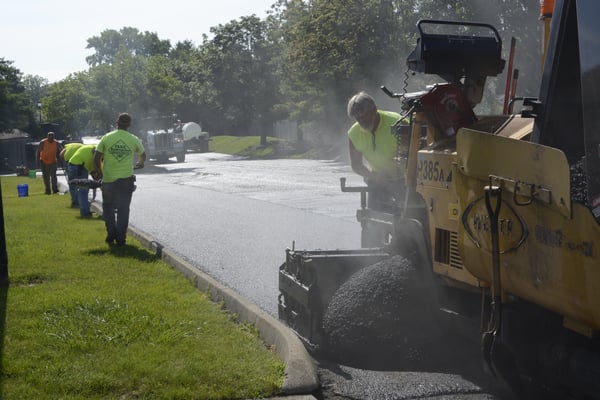
With time, your asphalt parking lot is bound to take a beating from harsh weather elements, heavy use, and old age.
Your once bright, smooth and fresh parking lot cannot stay new forever and you ought to be prepared for the day when deterioration takes over. Typically, a well-paved asphalt lot can last for 20+ years, but its condition after this long depends on many factors.
When It’s Time to Throw In The Towel and Commit to an Asphalt Repave:
Of course, every time you see a crack within your lot does not necessitate an overhaul and repave of the lot. There are tons of options to give your lot a makeover and so it looks new again -- from fixing potholes, to repainting/ striping your lot.
But, some damage is too big for the band-aids mentioned above. We’ve put together some tell-tale signs to know when it's more economical to repave your lot instead of fixing it.
1. If it starts showing alligator cracks
As the name suggests, alligator cracks resemble the scaly coat of an alligator. Cracks occur on asphalt paving as a result of old age and exposure to harsh weather elements.
With time, you are likely to note cracks widespread in areas that experience regular traffic, and they tend to deepen or enlarge with time. The freeze-thaw cycle in Ohio is especially brutal in contributing to alligator cracks.
Water seeps through the crevices and causes lasting structural damage to the lot’s foundation. If cracks have grown big and affected the integrity of your parking lot structure, it’s time to consider repaving it.
2. If you notice several potholes on the lot
If the parking lot starts developing potholes, that’s a definite indication that it’s time to repave it. Potholes start small and grow big fast if unchecked.
Plus, not only are they ugly and unappealing to your guests and customers, but also dangerous to their vehicles. They can damage their cars and affect your reputation, and maybe even result in liability issues.
3. If it is older than 20 years
As mentioned earlier, most paving lots have a lifespan of up to 20 years if properly paved. If yours is already a decade-old, then it’s time to repave it before it starts developing severe problems.
Repaving it will give it a new fresh look and improve its structural strength.
4. If it’s faded
When an asphalt lot is new, it possesses a rich black color that is appealing to the eye. Over time, the sun’s UV rays and regular traffic flow causes a lot to fade.
Although fading alone does not indicate the need for a repave, it could be an indication of a weakened pavement that is now more susceptible to cracks and damage -- especially when seen in combination with other signs. Consult a professional asphalt paving contractor to see if it’s time to sealcoat your lot.
Sealcoating will help preserve the life of your lot, and can often be used instead of a total repave. Here are some things to keep in mind when considering sealcoating:
- You don’t want to sealcoat every year. Too much sealer can build up start to flake off and be messy .
- Typically you should only sealcoat every 3 to 5 years depending on parking lot use.
5. If it becomes dented or bumpy
Heavy traffic on your pavement from large, loaded vehicles can cause it to develop dents over time. Areas such as in front of the dumpster where heavy loading and unloading often takes place may be the most affected.
Dents and dings result in a bumpy experience when driving on the lot. They also lead to pools/puddles of water that don’t drain properly and can cause massive damage. If you notice these dents and water pools, it’s time to contact a pro for repaving services.
Cost Considerations Before You Repave:
If you notice the above signs on your asphalt lot - and maybe over 1/3 of the lot’s surface area is covered with such damage (potholes, cracks, dents, etc.), then it’s more worth your money to repave it instead of fixing it.
However, repair costs can vary widely depending on the nature of repair required. Plus, considering that repairs are likely to be done more often, the total costs for repair are higher when compounded as compared to repaving costs.
Does your lot sound like it might be in need of a asphalt repave? Contact us for an estimate, and we’ll get your lot looking brand new again in no time.




